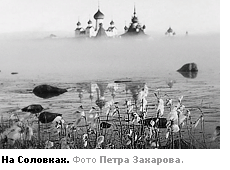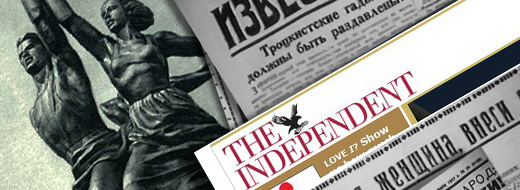The Independent о Соловках
"Соловки теперь у газетчиков в моде. Только ничего хорошего от такой моды Соловкам не будет. Чуть не в каждом журнале, в десятках газет появляются фотоэтюды и короткие репортажи о Соловках... "
( Юрий Казаков. "Литературная газета", 13.09.1966 )
Периодические издания пишут о Соловках: The Independent about Solovki and GULAG.
Russia: "After years of Soviet politics Russians have begun to rethink their magnificent cultural heritage. Christian orthodox monasteries are being restored, and those turned into gulags under Stalin's rule, such as on the Solovki islands, are being re-opened as museums." (Unknown author. The Ethical Travel Guide: Europe. The Independent. London. UK. Friday. www.independent.co.uk. 7 April 2006)Deti Solovkov
"In 1963 he directed his first film, the Tadjik-based Children of the Pamirs [Deti Pamira]. He was not first choice, and it glorified the regime that had killed his father... [...] When Motyl was three, his father, a Jewish-Polish engineer, was arrested and sent to the notorious Solovki camp where the following year he died. Several other relatives suffered similarly; Vladimir and his mother were exiled to the northern Urals, where she taught at a school for juvenile delinquents." (John Riley. Vladimir Motyl: Film director who battled for all his career against the Soviet authorities. The Independent. London. UK. Friday. www.independent.co.uk. Friday, 21 May 2010)...at least the claims are made public
 "In that respect among others, Guantanamo Bay is not the Gulag. No inmate's lawyers roamed Stalin's camps at Solovki, Vorkuta and Kolyma. The minutiae of their operations never found their way intoPravda and Izvestia. Even in today's war on terror, families are not informed that a prisoner has been sentenced to "10 years without the right of correspondence" - the icy Soviet formulation that everyone knew meant death, unannounced and unrecorded." (Rupert Cornwell. Guantanamo has to be closed - and soon. The Independent. London. UK. Friday. www.independent.co.uk. Saturday, 18 February 2006)
"In that respect among others, Guantanamo Bay is not the Gulag. No inmate's lawyers roamed Stalin's camps at Solovki, Vorkuta and Kolyma. The minutiae of their operations never found their way intoPravda and Izvestia. Even in today's war on terror, families are not informed that a prisoner has been sentenced to "10 years without the right of correspondence" - the icy Soviet formulation that everyone knew meant death, unannounced and unrecorded." (Rupert Cornwell. Guantanamo has to be closed - and soon. The Independent. London. UK. Friday. www.independent.co.uk. Saturday, 18 February 2006)
Solovki's "komarikee"
In Moscow, Rose George meets the jailhouse rockers hoping to be released:
"That evening, we take a trip to a suburb even further away than the Olympic Village. This is where Naum Nim lives, in a "typical Russian intelligentsia flat," says Daria - many books, not many fripperies (despite the Ikea catalogue in the corner). Nim is the editor of the Russian edition of Index on Censorship, the last issue of which was called "Return of the Gulag". He's a nice man with a patient manner which he's had time to perfect, given his two-and-a-half-year imprisonment for the penal code's infamous "political article". He was released when Gorbachev abolished the crime of political dissidence, after serving most of his sentence on "special regime", the harshest form of punishment, and one that's replaced the death penalty for lifers. "I wasn't particularly a rebel, but some people think it's humiliating to have to sing while they're marching." For his mild but stubborn objections, he spent most of his time in a damp concrete cell, in special regime clothes - thinner than usual - in central Russian winters, which aren't much better than the Siberian kind. "You just sit there. That's it.
He's mildly amused by the concert. "Look, it's like the North Pole. Wherever you go, you go south. With the state of our prisons, whatever Guin does, it's positive." Anyway, he says, it's not new. In the 1920s, the vile Gulag island camps of Solovki - where a favourite treatment was to tie a prisoner to a tree and let the black flies bite - had a famous theatre (Maxim Gorky went to visit, and wrote a glowing report). "But the prisoners were acting in their plays and, at the same time, they were being shot. What's more important - the decorative facade or the tortures? There's all this talk about reform, but it's just make-up." (Unknown author. It's 'Prisoner Pop Idol', 'Fame Academy in Handcuffs' - a competition in which incar cerated Russian killers and crooks can win the ultimate prize: their freedom. The Independent. London. UK. Friday. www.independent.co.uk. Saturday, 8 November 2003.)
Поделиться в социальных сетях

 "...не секрет, что в современной России не уделяется должного внимания изучению истории ГУЛАГа. И далеко не каждый школьник знает,
"...не секрет, что в современной России не уделяется должного внимания изучению истории ГУЛАГа. И далеко не каждый школьник знает,